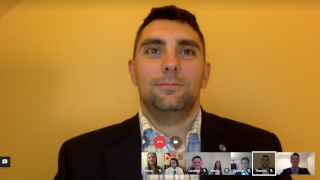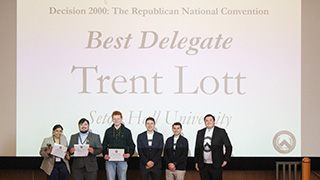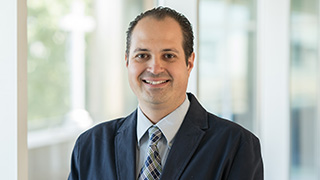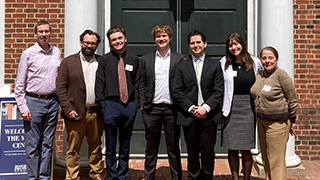National Security Fellowship Team Presents Findings to Top U.S. Government Officials
Tuesday, May 19, 2020

This project, titled "Leveraging Existing U.S. Resources to Promote Stability, Cooperation and U.S. Influence in the Kashmir Region," has been driven by graduate students Rebecca Blaser, Thomas Comer, Maria Gonzalez Esquivel, Caroline Hall, Spencer Hinton, Brian Stewart, and their team leader Shawn McFall.
The goal of the team's research was to develop strategic recommendations for senior policy advisors that encourage India to employ feasible measures of peaceful engagement with Pakistan, while upholding the United States' relationship with South and Central Asia as a neutral arbitrator. Ultimately, the team's priorities were to not only improve the quality of life in Kashmir, but to also to avoid the possibility of the two countries engaging in conflict.
After months of extensive research and deliberation, the team generated five recommendations for policy and decision-makers in the following categories: strategic messaging, civil relations, energy and economics, military, and Pakistan relations. The U.S. Department of State also provided members of the analytic community who work on the subject area to assist the fellows in their research.
The team presented their research and briefing to Ambassador Alice Wells, Acting Assistant Secretary for South and Central Asia, Ambassador Thomas Vajda, the Deputy Assistant Secretary for India, Bangladesh, Nepal, Sri Lanka, Bhutan, and Maldives at the Bureau Of South And Central Asian Affairs, the National Intelligence Manager for South Asia, and the principal intelligence advisor to the Director of National Intelligence on Afghanistan, Pakistan, India as well. The team also presented these findings virtually to high level officials from the State Department, Office of South Asia Analysis, Bureau of Intelligence and Research, and the Senior Department of Defense Subject Matter Expert on Afghanistan, Pakistan, and India at the Pentagon.
One of the fellows, first-year graduate student Rebecca Blaser, described the presentation as an "invaluable experience and a culmination of all the hard work we have done over the past four months." She continues, "Despite COVID-19 and the challenges of collaborating through online forums, we produced a truly cooperative paper and presentation that we all felt proud of."
Shawn McFall, a second-year graduate student, was personally asked by Mirghahari to lead the fellowship team through their research, analysis, and recommendations to address Indian and Pakistani policy in regard to Kashmir. "I accepted the role of team captain because I wanted to preserve the legacy of Oluwabemiga Oyeneye, who led the fellowship team last year with such grace and diplomacy."
He emphasized that the team is made up of students with diverse backgrounds and research interests, which made it easy to break their project up by specialization. McFall explained,
Our team members include students with military involvement, a background in economics, extensive knowledge of separatist movements, and editing experience, which was helpful in drafting our counter-messaging and civil relations recommendations. As a leader, my goal was to keep everyone on track and allow ideas to flourish by providing opportunities to put everyone's unique skills to work.
NSF fellow, Maria Gonzalez Esquivel, is a second-year graduate student specializing in International Economics and Development, and Latin America and the Caribbean. After being nominated to join the team, she saw great potential in the work as a learning experience. She believes,
As an international student, I consider the NSF an exceptional occasion to gain a better understanding of the dynamics of U.S. Foreign Policy and interagency collaboration. The scope of the research has allowed me to learn more about critical areas of international relations such as political economy, international security, and negotiation, while putting into practice all the knowledge acquired in my courses and through my research assistant positions with Dr. Benjamin Goldfrank and Dr. Nabeela Alam.
Caroline Hall, a graduate student in our B.S./M.A. program, feels that "this fellowship has been one of the most beneficial things I've done at Seton Hall. I couldn't be more appreciative of this group and all the work we put in over a short amount of time."
The work of the NSF will be distributed throughout the State Department, analysts for the Director of National Intelligence, the Defense Department, the National Security Council, and the US embassies and consulates in both India and Pakistan. The fellowship provides students with the tools to put theory into practice and enact real, tangible change in the world around them.
McFall says, "Knowing that you contributed to the United States' foreign policy is an achievement that will definitely stick with the group, and even encourage some to pursue government work as a profession after graduation."
In acknowledgement of their successful research presentation and of their dedication, work, and support to State Department's mission, the State Department granted honorariums to all the NSF students.
Look back on the past research teams' projects and experiences: Deepening Diplomacy in Washington, D.C. and Diplomacy on the Forefront.
Categories: Nation and World, Research





